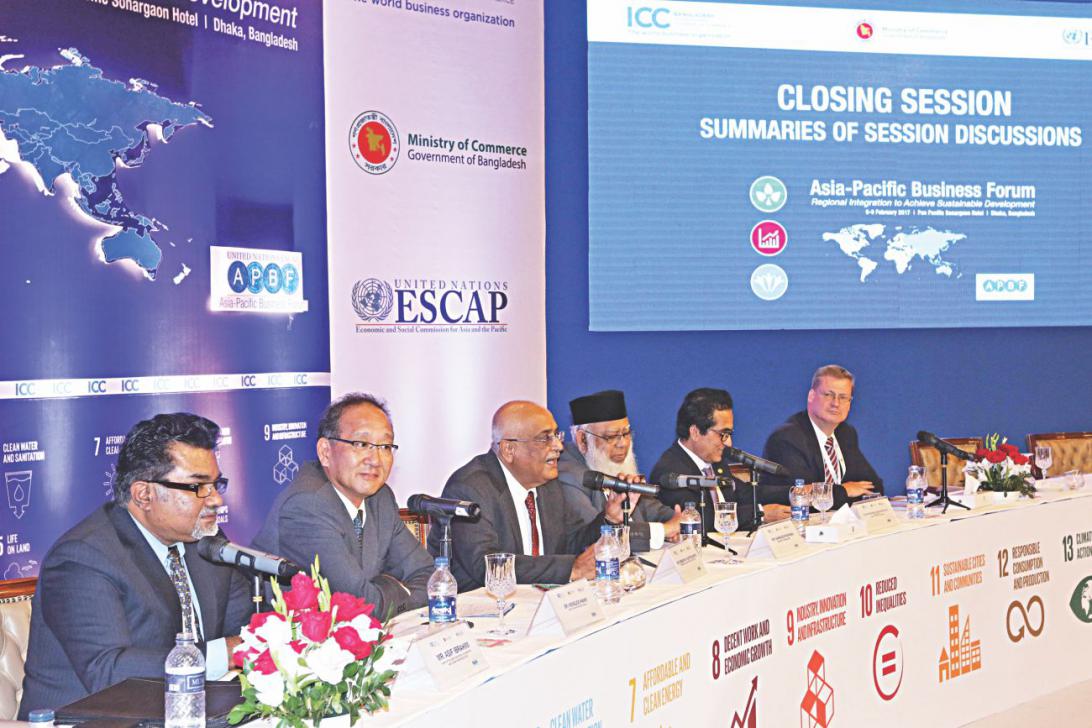Published in The Daily Star on Friday, 10 February 2017
Pvt sector’s role in implementing SDGs is crucial
Speakers tell Asia Pacific Business Forum conf’ce
Staff Correspondent

The Asia Pacific Business Forum ended in Dhaka yesterday affirming commitment to international cooperation for sustainable and inclusive economic growth.
The high-level conference also called upon governments of the Asia-Pacific region to collaborate with the business sector to ensure that the benefits from globalisation are fairly distributed.
Speakers at the two-day event at the Sonargaon hotel in Dhaka recognised the significant role businesses can play in implementing the Sustainable Development Goals (SDGs) that go beyond just providing decent jobs.
“The role of the private sector in implementing the SDGs is enormous,” said Hongjoo Hahm, deputy executive secretary of the United Nations Economic and Social Commission for Asia and the Pacific (ESCAP), in the concluding session.
He said strategies have to be better aligned for the private sector’s contribution.
Debapriya Bhattacharya, distinguished fellow of the Centre for Policy Dialogue, said the world is going through a turbulent transition.
He said the scenario has totally changed from what was five years ago when the role of globalisation was applauded and that now people are talking about its pitfalls.
The noted economist said new types of disasters are appearing, such as those in the form of Ebola and Zika, along with natural calamities.
Bhattacharya, however, also talked about opportunities in times of trouble. “…it is temporary. But those who survive are tough people and countries,” he said.
He said during turbulent times, Asia remains the beacon of hope, not only because of India and China but also for new entrepreneurship and ongoing reforms in many countries even in the face of falling exports and productivity.
He said the continent is innovating not only in cases of reforms, policies, institutions, enterprises and inclusive finance. “Asia is also innovating regional and sub-regional cooperation,” he said.
“On one hand, you have the turbulent transition. On the other hand, we have the most ambitious programme, namely SDGs,” he said, adding that it remains to be seen how a bridge can be built between the turbulent transition and delivery of the ambitious 2030 Agenda.
“It is the role of the private sector by way of delivering and connecting the two and implementing the SDGs. It is much beyond the corporate social responsibility and it is much more about ethical business,” he said.
Bhattacharya said business leaders themselves have spoken about the new partnership with the government and the civil society, and strategic partnership across borders with. “That gives us the hope,” he added.
Asif Ibrahim, chair of the ESCAP’s taskforce on disaster and climate risk reduction, presented recommendations from one of the sessions he moderated.
The entrepreneur said a central network can be established where businesspeople will share their practical experiences in order to reduce disaster risks.
The private sector, governments, civil societies and development partners will have to work together to improve quality of life, he said.
The session on supporting trade and transport facilitation for regional integration advocated for not keeping any sensitive list of products under regional trade agreements. Schemes like “Everything but Arms” may be followed, it added.
Speakers in the session recommended completion of regulatory procedures in a single day and effective implementation of agreements under initiatives such as BBIN (Bangladesh-Bhutan-India-Nepal), the BCIM Corridor (Bangladesh–China–India–Myanmar Forum for Regional Cooperation) and the BIMSTEC (the Bay of Bengal Initiative for Multi-Sectoral Technical and Economic Cooperation) for giving a big push to regional connectivity.
Speakers said structural policy reforms need to be strengthened in areas of education, governance and infrastructure, and that regional integration and quality infrastructure are very critical for sustainable growth.
The International Chamber of Commerce Bangladesh (ICCB) co-organised the event with the ESCAP and the commerce ministry of Bangladesh.
More than 400 delegates, including government officials and members of the civil society and business community, from home and abroad took part in the conference themed “Asia-Pacific Business Forum: Regional Integration to Achieve Sustainable Development”.
Mahbubur Rahman, president of the ICCB, and Md Mosharraf Hossain Bhuiyan, senior secretary of the industries ministry, also spoke at the concluding session.
This is the first time Bangladesh hosted the event taking place since 2004. It will be held next in Hong Kong early 2018.


